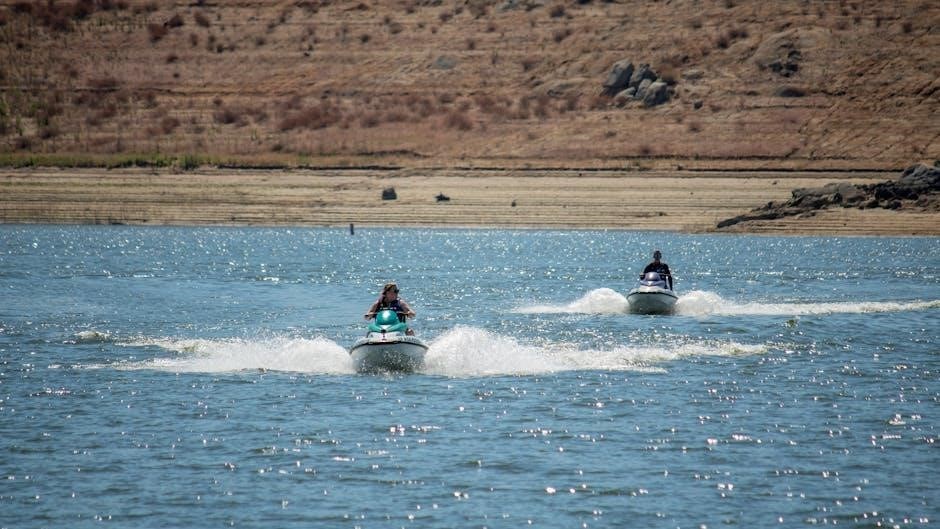Water fasting is the practice of consuming only water for a specified period, aiming to promote detoxification, autophagy, and mental clarity. It has been used for centuries in various cultural and spiritual contexts to enhance health and well-being. This guide explores its benefits, preparation, safety, and practical tips for a successful experience.
What Is Water Fasting?
Water fasting is the practice of abstaining from all food and drink except water for a defined period. It is a form of fasting where only water is consumed, with no calories, juice, or other beverages. This method is often used for detoxification, weight loss, or spiritual purposes. Unlike other fasts, it avoids any nutritional intake, relying solely on water to sustain hydration and support the body’s natural cleansing processes. The duration varies, ranging from short-term fasts of 24–72 hours to extended periods, depending on individual goals and health status.
History and Cultural Significance of Fasting
Fasting has deep roots in human history, with evidence of its practice dating back to ancient civilizations. Many cultures, including Egyptian, Greek, and Native American societies, used fasting for spiritual purification, rituals, and health. Religious traditions such as Christianity, Islam, and Buddhism also embrace fasting as a means of devotion, self-reflection, and discipline. Historically, fasting was not only a spiritual act but also a way to promote physical and mental renewal, making it a timeless practice across generations and cultures.
Why People Choose Water Fasting
Water fasting is chosen for its potential to promote detoxification, autophagy, and mental clarity. Many seek it for weight loss, improved energy, or spiritual growth. Others are drawn to its simplicity and ability to reset eating habits. Some individuals pursue it for philosophical or disciplinary reasons, while others aim to address chronic health issues. Regardless of the motivation, water fasting is often seen as a transformative experience that challenges both the body and the mind, fostering self-awareness and resilience.

Benefits of Water Fasting
Water fasting offers numerous benefits, including enhanced detoxification, autophagy, and mental clarity. It promotes weight loss, improves metabolic health, and fosters spiritual growth. Many report increased energy and self-discipline, making it a popular choice for overall well-being and self-reflection.
Physical Benefits: Detoxification and Autophagy
Water fasting triggers autophagy, a natural process where the body recycles damaged cells and proteins, enhancing cellular renewal. It also stimulates detoxification, as the liver and kidneys eliminate toxins more efficiently without digestive demands. During fasting, inflammation decreases, and immune function often improves. The body shifts to burning stored fat for energy, promoting weight loss and improved metabolic health. This cleansing process can leave you feeling lighter, with increased energy levels and a rejuvenated system overall.
Mental and Emotional Benefits: Clarity and Discipline
Water fasting enhances mental clarity by reducing mental fog and improving focus. The absence of digestive strain allows the brain to function more efficiently, leading to heightened concentration and creativity. Emotionally, fasting fosters resilience and self-discipline, as individuals learn to manage hunger and cravings. This practice often results in a deeper sense of emotional balance and stability, with many reporting reduced anxiety and a clearer mind. The discipline cultivated during fasting can translate into other areas of life, promoting overall personal growth and self-mastery.
Spiritual and Philosophical Benefits
Spiritual and Philosophical Benefits
Water fasting holds profound spiritual significance, often used in religious and philosophical traditions to deepen self-awareness and connection with the divine. Many practitioners report heightened introspection and a sense of inner peace, fostering a stronger spiritual practice. Philosophically, fasting encourages humility, gratitude, and detachment from material desires, promoting a deeper understanding of life’s essence. This practice often aligns with principles of mindfulness and minimalism, helping individuals reconnect with their true selves and the world around them on a more meaningful level.

Preparation for Water Fasting
Preparation is key to a safe and successful water fast. Gradually reduce food intake, stay hydrated, and mentally prepare. Consult a healthcare professional, especially if you have medical conditions, to ensure a smooth transition and address potential risks. This step is crucial for minimizing side effects and setting a positive foundation for your fasting journey.
Steps to Prepare Your Body and Mind
Preparing for a water fast involves gradually reducing food intake, focusing on light meals, and staying hydrated. Mentally, set clear intentions and educate yourself on the process. Transitioning to a fasting-friendly diet, such as fruits, vegetables, and whole grains, helps ease the body into fasting mode. Emotional preparation is equally important—practice mindfulness, rest, and reduce stress. Proper hydration and electrolyte balance are crucial before starting. Consulting a healthcare professional is essential, especially for those with health conditions, to ensure safety and address concerns. This preparation lays the foundation for a successful fasting experience.
What to Eat Before Starting a Water Fast
Before starting a water fast, focus on consuming light, easily digestible foods to minimize digestive stress. Emphasize fruits, vegetables, whole grains, and lean proteins. Avoid heavy, fatty, or sugary foods that may cause discomfort. Incorporate foods rich in fiber, such as leafy greens and berries, to support detoxification. Stay hydrated with water and consider including herbal teas. Avoid processed foods, caffeine, and alcohol to prevent withdrawal symptoms. This transitional diet helps your body adapt, making the fasting period smoother and more manageable. Proper nutrition pre-fast lays a strong foundation for success.
Hydration Tips and Electrolyte Balance
Proper hydration is essential during a water fast. Drink plenty of water throughout the day, aiming for at least 8-10 glasses. To maintain electrolyte balance, consider adding a pinch of sea salt or lemon juice to your water. Natural coconut water or vegetable broths can also provide essential minerals without breaking your fast. Avoid overhydration, which can strain the body. Monitor your urine color to ensure it’s pale yellow, indicating adequate hydration. Electrolyte imbalance can lead to dizziness or fatigue, so listen to your body and adjust accordingly for a safe fasting experience.
Safety and Contraindications
Certain groups, such as pregnant women, children, and those with chronic illnesses, should avoid water fasting. Consult a healthcare professional before starting, especially if you have medical conditions.
Who Should Avoid Water Fasting
Certain individuals should avoid water fasting due to potential health risks. These include pregnant or breastfeeding women, children, people with chronic illnesses like diabetes or heart disease, and those with a history of eating disorders. Individuals taking medications that require food intake or have conditions like low blood pressure should also avoid fasting. It is crucial to consult a healthcare professional before starting a water fast, especially for those with underlying medical conditions, to ensure safety and avoid complications.
Common Side Effects and How to Manage Them
Dizziness, nausea, and fatigue are common during water fasting due to dehydration and electrolyte imbalances. Staying hydrated with water and replenishing salts can help. Headaches may occur, often manageable with rest. Hunger pangs can be eased by drinking water and focusing on your fasting goals. If side effects persist or worsen, it may be necessary to break the fast early. Always listen to your body and consult a healthcare professional if concerns arise.
Medical Conditions That May Be Affected by Fasting
Diabetes, heart conditions, and electrolyte imbalances can be exacerbated by water fasting. Fasting may lower blood sugar levels, posing risks for diabetics, and dehydration can strain the heart. Electrolyte deficiencies may worsen conditions like arrhythmias. Individuals with a history of eating disorders or severe malnutrition should avoid fasting. Consulting a healthcare provider is essential for those with chronic illnesses to ensure fasting is safe and appropriate for their condition.

How to Perform a Water Fast
Start with a clear goal, whether for detoxification, mental clarity, or spiritual growth. Set a duration, stay hydrated with pure water, and monitor your physical and emotional state. Rest, meditate, and avoid strenuous activities to support your body during the fasting period.
Choosing the Right Duration for Your Fast
Duration varies based on experience and goals. Beginners often start with 24–72 hours, while experienced fasters may opt for 7–14 days. Longer fasts (30+ days) are rare and typically require medical supervision. Always consider health status, with shorter fasts recommended for those new to fasting or with certain medical conditions. Listen to your body and adjust the timeframe as needed to ensure safety and comfort. Consulting a healthcare provider is crucial before extending beyond a few days. Start small and progress gradually for the best experience.
What to Expect During the Fasting Period
Different individuals experience fasting differently. Physical symptoms like hunger, fatigue, or dizziness may arise, especially in the first few days. Mentally, some people feel heightened focus and clarity, while others might struggle with irritability. Emotional fluctuations are common as the body adjusts. It’s important to rest adequately and stay hydrated. Most people find a balance after the initial adaptation phase, leading to a smoother fasting experience. Everyone’s journey is unique, so it’s crucial to listen to your body and adjust as needed for comfort and safety.
How to Stay Hydrated and Energized
Staying hydrated is essential during a water fast, requiring 8-10 glasses of pure water daily. Listen to your body and drink when thirsty. Incorporate light physical activity, like gentle walks, to maintain energy levels. Rest when needed and avoid overexertion. Consider adding a pinch of sea salt to water for electrolytes. Focus on mental clarity through meditation or reading. Prioritize sleep to recharge. Everyone’s needs differ, so adjust hydration and rest accordingly to sustain vitality throughout the fasting period. Consult a healthcare professional if energy levels drop significantly.

Breaking the Fast
Breaking the fast requires careful reintroduction of food to avoid digestive stress. Begin with light, easily digestible foods and consult a healthcare professional for a safe transition.
Best Practices for Ending a Water Fast Safely
Safely ending a water fast involves a gradual reintroduction of nutrients to avoid shocking the system. Start with small amounts of diluted vegetable broth or coconut water to replenish electrolytes. After 24-48 hours, introduce soft, easily digestible foods like steamed vegetables or pureed fruits. Avoid heavy meals, sugar, or caffeine initially. Listen to your body’s signals and consult a healthcare professional if discomfort arises. Patience is key to restoring digestive balance and preventing potential complications.
What to Eat After Fasting
After fasting, it’s crucial to reintroduce foods gently to support digestion. Begin with small portions of steamed vegetables, herbal teas, or pureed fruits. Gradually incorporate lean proteins like chicken or fish, and whole grains like rice or quinoa. Avoid heavy, sugary, or processed foods to prevent digestive upset. Opt for nutrient-dense, easily digestible meals to replenish energy and nutrients. Listen to your body and adjust your diet based on how you feel, ensuring a smooth transition back to regular eating habits.
Reintroduction of Solid Foods
Reintroducing solid foods after fasting requires careful planning to avoid digestive discomfort. Start with bland, easily digestible options like broths, steamed vegetables, or soft fruits. Gradually incorporate lean proteins such as eggs or tofu, followed by whole grains like oatmeal or brown rice. Avoid spicy, fatty, or high-sugar foods initially. Listen to your body’s signals, as some foods may cause bloating or discomfort. A slow, mindful approach ensures a smooth transition and minimizes the risk of digestive upset or nutrient overwhelm.

Weight Loss and Water Fasting
Water fasting can lead to weight loss through caloric deficit and fat metabolism. However, much of the weight lost is water weight, which may return after fasting. Sustainable results require a healthy diet and lifestyle post-fast.
How Water Fasting Affects Weight Loss
Water fasting can lead to significant weight loss due to a caloric deficit, as the body relies on stored energy sources like fat. During the fast, the body metabolizes fat for fuel, and water weight is shed rapidly. However, this weight loss is not solely fat loss; it also includes water and muscle mass. The initial drop in weight is often dramatic, but it’s important to note that much of this is temporary and may return after the fast.
Despite this, water fasting can kickstart a weight loss journey by reducing insulin levels and increasing fat breakdown. Sustaining weight loss requires adopting a healthy diet and lifestyle post-fast to maintain the metabolic changes.
Sustainable Weight Management Post-Fast
Post-fast weight management requires a gradual and balanced approach to maintain results. Transitioning to nutrient-dense, whole foods helps stabilize weight and metabolism. Incorporating lean proteins, healthy fats, and fiber-rich vegetables supports long-term weight control. Regular physical activity and mindful eating habits are crucial to prevent rebound weight gain. Hydration and portion control also play key roles in sustaining a healthy weight. A sustainable lifestyle, rather than restrictive dieting, ensures lasting benefits and overall well-being after the fasting period.

Detoxification and Cleansing
Water fasting promotes detoxification by allowing the body to focus on eliminating toxins through natural processes like urination and sweating. The cleanse supports the liver, kidneys, and digestive system in resetting and rejuvenating, enhancing overall health and vitality naturally.
How Water Fasting Supports the Body’s Detox Processes
Water fasting enhances the body’s natural detoxification processes by allowing organs like the liver, kidneys, and colon to focus on toxin elimination. Without the burden of digestion, the body allocates energy to flush out stored toxins through urination, sweating, and bowel movements. Autophagy, a natural cellular cleansing process, is also stimulated, helping to break down and recycle damaged cells and proteins. This holistic cleanse supports the body’s ability to reset and rejuvenate its systems, promoting overall health and vitality.
Myths and Facts About Detoxification
Detoxification is often surrounded by myths, such as the belief that supplements or juices are required to cleanse the body. In reality, the body has its own efficient detox systems, including the liver, kidneys, and lymphatic system. Water fasting supports these processes by reducing digestive load, allowing the body to focus on eliminating toxins naturally. While fasting can enhance detoxification, it’s not a magic solution and should be approached with caution. Proper planning and medical consultation are essential to ensure safety and effectiveness.

Tips for a Successful Water Fast
Stay hydrated by drinking plenty of water, and consider adding electrolytes to maintain balance. Rest adequately, listen to your body, and plan for a gradual transition post-fast.
Staying Motivated and Focused
Staying motivated during a water fast requires clear intentions and reminders of your purpose. Track your progress, celebrate small victories, and visualize the benefits. Create a daily routine that includes mindfulness, journaling, or meditation to stay centered. Surround yourself with supportive people and avoid negative influences. Hydrate consistently, rest when needed, and listen to your body. Stay positive, and remind yourself that the journey, though challenging, is temporary and rewarding. Focus on the mental clarity and renewed energy that fasting brings.
Managing Hunger and Cravings
Managing hunger during a water fast begins with staying hydrated by sipping water regularly. Consider adding a pinch of sea salt for electrolyte balance, which can reduce cravings. Distract yourself with light activities, meditation, or reading to shift focus from hunger. Practice mindfulness to observe cravings without acting on them. Rest when needed, as fatigue can amplify hunger. Remind yourself of your fasting goals to stay motivated. These strategies can help make the fasting period more manageable and increase your chances of success.
Tracking Progress and Adjusting Your Plan
Track your progress during a water fast by monitoring weight, energy levels, and mental clarity. Use a journal to document daily observations, including hunger patterns and emotional states. Adjust your plan if physical or mental discomfort arises, such as shortening the fast duration. Stay hydrated by drinking water regularly and consider adding a pinch of sea salt for electrolytes. Listen to your body’s signals, like dizziness or fatigue, which may indicate the need to end the fast early. Rest when needed and plan for a gradual reintegration of foods post-fast.
Common Mistakes to Avoid
Common mistakes during water fasting include overexertion, ignoring bodily signals, and improper rehydration. Avoid extreme physical activity and listen to your body to prevent complications. Ensure electrolyte balance and avoid rushing the fasting process to maintain safety and effectiveness.
Overexertion and Physical Strain
Overexertion during water fasting can lead to physical strain, dizziness, and fainting. Avoid strenuous activities, as fasting already reduces energy reserves. Rest is crucial to allow your body to focus on detoxification and healing. Engaging in light exercises like walking or yoga is acceptable, but avoid intense workouts. Ignoring fatigue signals can worsen fasting side effects. Prioritize rest, hydration, and electrolyte balance to maintain stability and prevent complications. Listen to your body to ensure a safe and effective fasting experience.
Incorrect Rehydration Practices
Incorrect rehydration practices can disrupt electrolyte balance and cause health issues. Drinking excessive water without electrolytes may lead to hyponatremia, a dangerous condition. Avoid sugary or caffeinated beverages, as they can dehydrate the body further. Post-fast, opt for coconut water or vegetable broth to restore electrolytes gradually. Gulping water quickly can cause nausea or stomach discomfort. Always sip slowly and listen to your body’s hydration needs to prevent complications and ensure a safe fasting experience.
Ignoring Your Body’s Signals
Ignoring your body’s signals during a water fast can lead to severe health complications. Symptoms like dizziness, nausea, or extreme fatigue are signs that your body needs attention. Dismissing these indicators may result in dehydration, electrolyte imbalances, or organ strain. It’s crucial to listen to your body and adjust your fasting plan accordingly. If you experience persistent discomfort, consider ending the fast early or consulting a healthcare professional. Prioritizing your health ensures a safer and more beneficial fasting experience.
Water fasting can be a transformative experience when approached with care and awareness. By understanding its benefits, risks, and proper practices, you can harness its potential to enhance your health and well-being. Remember to prioritize your body’s needs and seek guidance when necessary. With mindful preparation and execution, water fasting can offer profound physical, mental, and spiritual renewal, empowering you to embrace a healthier, more balanced lifestyle.
Final Thoughts on Water Fasting
Water fasting is a profound practice that offers physical, mental, and spiritual renewal. It can enhance detoxification, boost autophagy, and foster self-discipline. However, it’s crucial to approach fasting with caution, ensuring proper preparation and understanding potential risks. Consulting a healthcare professional is essential, especially for those with medical conditions. By listening to your body and adhering to safe practices, water fasting can be a transformative experience, promoting overall well-being and empowering you to embrace a healthier lifestyle. Always prioritize your health and safety above all else.
Encouragement and Next Steps
Embrace water fasting as a journey of self-discovery and renewal. With proper preparation and mindset, it can lead to remarkable physical and mental transformations. Start with shorter fasts to build confidence, then gradually extend durations as your body adapts. Celebrate small victories, like increased energy or clarity, and share your experiences with others for accountability. Post-fast, integrate healthy habits to sustain benefits. Remember, water fasting is not just about deprivation—it’s an empowering step toward a healthier, more mindful you.


